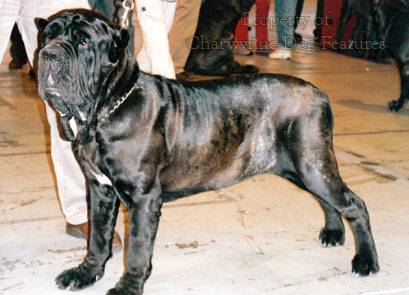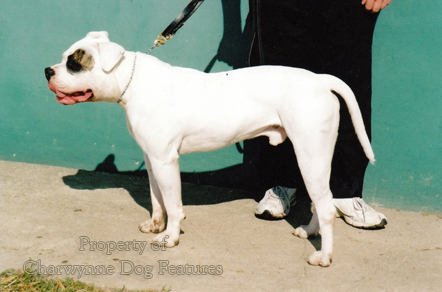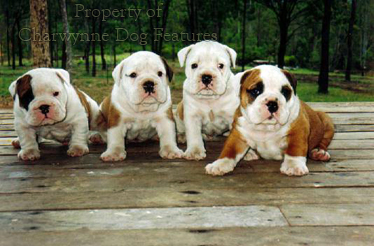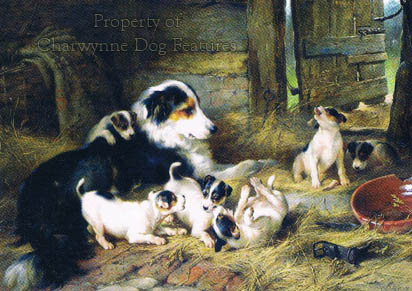490 Valuing your Dog
VALUE YOUR DOG
by David Hancock
 Oscar Wilde, in 'Lady Windermere's Fan', defined a cynic as a man who knows the price of everything and the value of nothing. This phrase came back to me a few years ago when in the morning I visited a local Blue Cross rescue kennels and in the afternoon was told of over £1,000 per dog being paid for Neapolitan Mastiffs and American Bulldogs, just out of quarantine. The staff at the rescue kennels told me of quite young pedigree dogs, some 'with papers', being brought in for rehoming. These dogs must have cost several hundred pounds and, in some cases, not that long previously. The rescue kennels' staff stated that, apart from crafty customers trying to buy a pedigree dog 'on the cheap', it was just as difficult to rehome a pure-bred dog as a mongrel. The general public seemed to value a dog on its individual appeal; that's encouraging.
Oscar Wilde, in 'Lady Windermere's Fan', defined a cynic as a man who knows the price of everything and the value of nothing. This phrase came back to me a few years ago when in the morning I visited a local Blue Cross rescue kennels and in the afternoon was told of over £1,000 per dog being paid for Neapolitan Mastiffs and American Bulldogs, just out of quarantine. The staff at the rescue kennels told me of quite young pedigree dogs, some 'with papers', being brought in for rehoming. These dogs must have cost several hundred pounds and, in some cases, not that long previously. The rescue kennels' staff stated that, apart from crafty customers trying to buy a pedigree dog 'on the cheap', it was just as difficult to rehome a pure-bred dog as a mongrel. The general public seemed to value a dog on its individual appeal; that's encouraging. 
The Victorians had confused attitudes towards dogs, building up the feats of hero-breeds like the St. Bernard and the Newfoundland whilst creating the need for animal welfare societies through widespread mistreatment of dogs. Dog-carts were eventually banned, not just because of traffic congestion but because of the appalling way in which traders treated their draught dogs. Writers and artists over-romanticised dogs whilst dog-fighting and illegal baiting flourished. Both the artist and the barbaric 'sports' participants valued the dogs which brought them a financial reward, albeit in a very different way. Fashion can of course affect the financial value of a breed, especially a recently-introduced one. Sadly today's £1,000 Neapolitan Mastiff can soon become tomorrow's fading asset or worse, rescue problem. There is nothing new in this. Breeders of St. Bernards at the end of the 19th century made a fortune out of the public excitement following exaggerated stories of their prowess in snow rescue. Seeing the fate of some temporarily popular breeds, it is tempting to avoid singing the praises of foreign breeds for fear of attracting interest from capricious would-be owners. 
Fifty years ago I used to chat to an elderly man who had been a shepherd on Salisbury Plain for most of his working life. He didn't talk about the harshness of the weather, the loneliness of spending whole summers out on the plain or of the eternal difficulties of sheep farming. He talked of his greatly valued and much missed 'Bobtails', his herding dogs. He could recall the names of a score of dogs, especially the one that saved him in a snowdrift and the one that warned him of an unexploded shell. For me, that's the greatest value of dogs; they provide something that no other source can; they share their philosophy of life with you and accept yours; they are only interested in external matters and never indulge in self-pity, vanity or the human obsession with appearance. They do suffer from the latter however -- especially the long-coated breeds! 
Valuing a breed surely means knowing what provides it with spiritual contentment and striving to provide at least an element of that need. People who buy a gundog and then expect it to lie in front of the television all day end up with an extremely discontented dog and wonder why. People buy a dog from a guarding breed and then complain that it resents the dustman taking their rubbish away. People buy a small assertive terrier and then express surprise when it resents next door's cat coming into its garden. Educated people should keep in mind Dean Inge's wise words of eighty years ago: "The aim of education is the knowledge not of facts but of values." Valuing dogs is not some maudlin mawkish over- sentimental act of anthropomorphism. It is a combination of genuine affection, empathetic respect and compassionate care. 
One of the reasons why I do not breed dogs is because I know I could not find homes for the pups where they would be valued. I know of prominent breeders who will happily export dogs to Asian countries where dog is not and never has been valued. I was recently offered a Mastiff pup from a breeder, and when I explained I didn't have the facilities for such a breed, he replied "Oh, go on, I've just sold one to someone who lives in a flat." The Metropolitan Police will tell you of endless examples of the largest of dogs being kept in the smallest of flats. The last thought it seems of such owners is the needs of the dog. They will proudly tell you how much they paid for it!
Human beings with a hobby can quite often let it get out of hand and lose their way. But it is always a conscious activity. Similarly, some writers on dogs, lose their way and choose to rubbish well-intentioned campaigners against dogs being bred without regard to their genetic health or physical well-being. The 400 inheritable conditions identified in dogs are perversely compared by them to the 1,000 identified in humans, as though that excuses man, who alone decides dog's fate. Some writers even defend breeds with gross exaggerations, ones which actually inflict discomfort. Dogs bred to a harmful design are clearly not greatly valued, but they are usually highly priced!